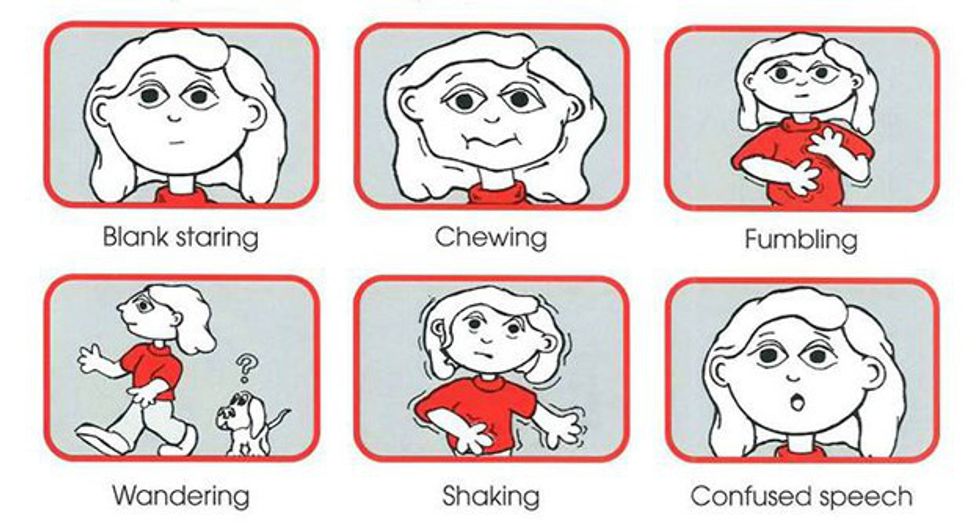When a parent is diagnosed with a disorder or disease, you read up on it just in case you have it too. When a parent AND a sibling are diagnosed, you read even more because you just know you have it too. Around two years ago, my mother was diagnosed with epilepsy. This was the culmination of over 15 years of research into what caused her constant exhaustion and aches, as well as her dealings with often less than helpful doctors. Epilepsy and neurological disorders are difficult to diagnose and understand at times, but here are a few things that are well understood about them:
1. Seizures Come In Many Forms
Most people have a basic understanding that seizures are the result of surging electrical activity in the brain. This much is easy to understand, especially with the image of a person twitching/shaking or moving uncontrollably (and often violently). Though that image makes the concept easy to understand, it is very much a wrong way to look at seizures, which come in a variety of forms, such as: Staring spells/distraction, slurred or confused speech, muscles tightening/spasming/tensing, repeated actions or movements (Chewing, pacing, fidgeting, rocking) without awareness, or even lack of movement or incapability of moving. These are just a few items from the very long list of what can happen during a seizure.
2. Flashing Lights Are Rarely Triggers...
First things first, let's dispel the standard image of blinking lights starting a seizure episode. In fact, only about 2-3% of epileptics have photosensitive epilepsy, and those that do have it are often younger people who have reactions less often as they age (usually). The idea that the flashing lights of anime and video games will set of seizures in even the most standard of individuals is a joke running back ages, though has certainly become less in-vogue. But since children are more likely to have this kind of epilepsy, and more likely to play games/watch cartoons, it makes sense that the connection caught on.
3. ...But Stress And Exhaustion Often Are Triggers (And Sometimes Symptoms)
Other Triggers are: Specific times of day, fevers, alcohol or drug use, menstruation, low blood sugar, certain foods/caffeine, and certain medications.
Though the stress/exhaustion thing puts some of college into perspective for me.
4. Epilepsy And Migraines Are Related - And Often Co-Morbid...
Just in case having one painful disorder with a multitude of triggers wasn't bad enough, If you have Migraines or Epilepsy, you are at least twice as likely to have the other disorder as well! It's hard to diagnose when an individual has both however, due to the fact that:
A. Epilepsy treatments and Migraine treatments often overlap (possibly treating one without noticing the other)
And
B. Symptoms for the two are often similar (Visual changes, dizziness, nausea and the like)
Both disorders also feature the same "aura" that many people recognize as the sign of a coming migraine.
So it may be worth paying close attention to your migraines or seizures, just in case something doesn't add up.
5. ...And Both Also Give Killer Hangovers
Since a seizure is basically the brain going into hyper-overdrive thanks to an electrical surge, it makes sense that seizures would cause exhaustion, fogginess, confusion, sleepiness, nausea, thirst, and (of course) headaches, much like migraine hangovers (minus the headache).
But Epilepsy isn't all bad news!
6. High Fat Diets May Help Prevent Seizures
According to Epilepsy.com, a ketogenic (High fat, low carb) diet can help an individual a great deal when dealing with seizures. It's not entirely apparent how the diet helps seizure sufferers, some theorize it has to do with the ketones that are produced (Keto = ketones, genic = producing) when the body is largely using fats for energy, but it may also have to do with replenishing the myelin sheath that protects neurons, or even because carbohydrates are a common trigger for seizures. Whatever the reason, this diet has proven effects for many!
I may or may not have epilepsy. I'm seeing things that may or may not be there at this point. However, even if I do have epilepsy, I might not have seizures to go along with it, but I am learning so much as my mother and sisters find ways to deal with this difficult disorder. I'm confident I'll be prepared to adjust my life as need be. Hopefully, someone out there can see this and help out someone in their own life!

























